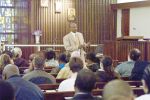For ex-offenders like Leo Halcomb, starting a new life after prison is full of setbacks, the greatest of which is finding a job. Many feel they are reentering a society that doesn’t want to see them succeed, but Halcomb was able to overcome these obstacles with the help of family and friends.
“I faced the dilemma of not having a job, but I had people who were there for me,” Halcomb said. “I had a good support system.”
 |
| FULL HOUSE—Leo Halcomb speaks at Trinity Lutheran Church on the North Side.
|
Halcomb was one of many speakers at the Get Back to Work Help Fair, hosted by the Homewood-Brushton YMCA on March 25. Approximately 140 parolees attended the fair in hopes of finding information on career development and maybe even finding a job.
Like others at the fair, Halcomb, who now works as a counselor at TADISCO Community Support Service, is a recovered drug addict. He did volunteer work for two years before being employed in a paying position. This showed employers he was capable of turning his life around.
“I know that everyone in that room deep down really wants to change the way they’re living, but they’re not. They have to feed their families,” Halcomb said. “They’ve been programmed that fast money is better than slow money. They’re willing to take that risk. How do we change that? One person at a time.”
Now Halcomb works to help others overcome their addiction, turn away from drug dealing and find a job. He said many employers won’t hire someone with a record, but urges others not to lie on applications because employers will eventually find out.
“I have this list of all these jobs that say they’ll hire ex-offenders. Some of them will, some of them won’t. It’s very easy for a company to make something up and then they’ll say it’s not because of your record,” Halcomb said. “It’s hard because how can you police a company that’s not getting federal money. Right now it’s even hard for people who’ve never been in trouble (to find a job).”
With barriers like these beyond their control, Halcomb said parolees should focus on their own development. He urged those in the audience to persevere to prove they are reformed and capable of working hard.
“One of the big barriers is we as a people not believing in ourselves. We give up too easily,” said Halcomb. “I’m a success story and I’m only successful because I had some humility. There’s a lot of anger in that room. We blame it on society but once we get some clarity we realize I did this.”
Carena Phillips, director of Career and Workforce Development Center East, agrees ex-offenders should focus on bettering themselves, especially their social skills. She said changing the behavior of parolees would make employers more willing to hire them.
“A lot of them do not have the social skills necessary to work in a job. That system makes them feel that they’re entitled,” Phillips said. “Jail doesn’t undo that behavior, it creates that. We need to try to begin to change mindsets.”
Phillips’ main criticism of the judicial system is that it doesn’t give ex-offenders enough preparation to re-enter society. She said the prison system should include educational programs to help inmates address their academic shortcomings. She also said agencies that work with parolees should do more follow-up to monitor how they are progressing.
“The system is so hard to reintegrate that they go back to that lifestyle,” Phillips said. “The system is set up to make sure they ricochet back in.”